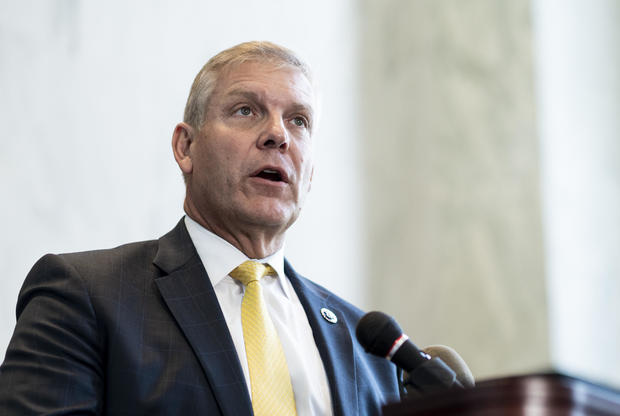Washington — Lawmakers on the House select committee investigating the January 6 insurrection at the U.S. Capitol have asked Republican Rep. Barry Loudermilk of Georgia to voluntarily provide information regarding a tour they say he led through parts of the Capitol complex the day before the assault.
Committee Chairman Bennie Thompson, a Mississippi Democrat, and Vice Chair Liz Cheney, a Wyoming Republican, told Loudermilk in a letter Thursday that they believe he has information regarding the January 5 tour, which they said “raises questions to which the select committee must seek answers.”
The lawmakers said public reporting and witness accounts indicate some people and groups sought to gather information about the layout of the Capitol and House and Senate office buildings ahead of January 6, when lawmakers convened for a joint session of Congress to tally state electoral votes and reaffirm President Biden’s win. Democrats have accused Republicans of leading so-called “reconnaissance tours” of people who then breached the Capitol on January 6.
Republicans on the House Administration Committee, on which Loudermilk sits, claimed to have reviewed security footage in the days before January 6 and found “there were no tours, no large groups, no one with MAGA hats on,” the letter states, citing a comment from an unnamed House Republican aide to the publication The Hill.
“However, the select committee’s review of evidence directly contradicts that denial,” Thompson and Cheney told Loudermilk.
Loudermilk issued a statement with the Republican ranking member of the Committee on House Administration, Rodney Davis, accusing the committee of pushing a “verifiably false narrative.”
“A constituent family with young children meeting with their Member of Congress in the House Office Buildings is not a suspicious group or ‘reconnaissance tour,'” the statement said. “The family never entered the Capitol building.”
Bill Clark/CQ-Roll Call, Inc via Getty Images
Loudermilk is one of several House Republicans, including House Minority Leader Kevin McCarthy, who the select committee wants to speak with. The panel first sought voluntary interviews with a group of five Republicans — McCarthy and Reps. Jim Jordan of Ohio, Scott Perry of Pennsylvania, Andy Biggs of Arizona and Mo Brooks of Alabama — but last week issued subpoenas to each for testimony, escalating its efforts to obtain information. The committee has also asked to meet with Rep. Ronny Jackson of Texas, but has not issued him a subpoena.
The House select committee is set to begin hearings on June 9 into the attack, and Thompson said on Thursday that the committee has already confirmed some witnesses. The Mississippi Democrat said earlier this week the first hearing will “more or less” show what the committee has learned over the past year.
He said that it was “not our expectation to call” former President Donald Trump as a witness.
“Well, we’ve looked at talking to a lot of people. We’ve not canceled out anything, but there’s no feeling among the committee to call him as a witness at this point,” Thompson said about the former president. “He’s a former president, and we’re not sure that the evidence that we receive can be any more validated with his presence.”
Democratic Rep. Pete Aguilar of California, who is on the committee, said earlier this week that the committee will spend “some time” during the June hearings focusing on the 187-minute period on January 6, when Trump resisted calls to tell his supporters to go home.
“I think that you’ll see, you know, different pieces of media from tweets to witness testimony, maybe to visual depictions within that, within that time frame,” Aguilar said. “We’ll devote some time in the hearings, specifically to that topic, and I think it’s important to understand, because the broad pieces, you know, why didn’t the president do more? Why didn’t the former president make a more public stand to tell people to leave the Capitol and to tell the insurrectionists to leave and did he know at the time that violence was happening here in the Capitol? And our belief is that he did.”
The committee has issued dozens of subpoenas, including ones to Trump’s allies, former White House officials, campaign aides and individuals involved in the planning of the rally outside the White House before the Capitol building came under siege. Two top Trump allies, Steve Bannon and former White House chief of staff Mark Meadows, have been held in contempt of Congress for refusing to comply with subpoenas, and the Justice Department has charged Bannon. Both said they are following instructions from Trump, who has claimed executive privilege.
Rebecca Kaplan, Zak Hudak and Ellis Kim contributed to this report.
